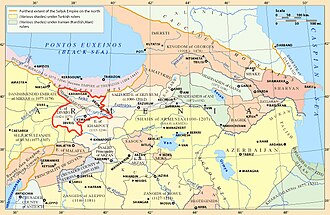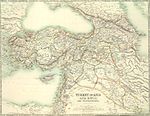House of Mengüjek
This article has multiple issues. Please help improve it or discuss these issues on the talk page. (Learn how and when to remove these template messages)
|

The House of Mengüjek (Modern Turkish: Mengüçoğulları, Mengücek Beyliği or Mengüçlü Beyliği; the reigning dynasty is known as Mengujekids or Menkujakids) was an Anatolian beylik of the first period, founded after the Battle of Manzikert. The Mengujekids ruled the regions of Erzincan, Kemah, Şebinkarahisar and Divriği in Eastern Anatolia in the 12th and 13th centuries.
Mengüjek Gazi[edit]


Little is known about the founder Mengüjek Ghazi.[1] He was probably one of the commanders of the Great Seljuk, and his principality seems to have been founded in the years following the battle. The beylik was split into the Erzincan and Divriği branches after the death of Emir İshak in 1142.[1] By 1178, Behramşah, of the Erzincan branch, had proved their allegiance to the Rum Seljuks through marriage.[2] While the Divriği branch under Şahinşah, recognized the Sultanate of Rum as their overlords by declaring it on their copper coins.[2]
The Erzincan branch was subjugated by the Sultanate of Rum in 1228,[3] and the Divriği branch was ended by the Ilkhanate in 1277.
Divriği Great Mosque[edit]
The Mengüjek dynasty is remembered primarily for its monuments in Divriği. The Divriği Great Mosque was built in 1228 by Ahmed Shah. The adjoining medical center, or Darüşşifa, was built in the same year by Turan Melik, daughter of the Mengüjek ruler of Erzincan, Fahreddin Behram Shah. Both buildings are on UNESCO's World Heritage List.[4]
Numismatics[edit]
Sayf al-Din Şahinşah's coinage, of which there are three known varieties in copper, captures the essence of Seljuk dominance as it was felt in Divrigi in late twelfth-century Anatolia.[5] The earliest type, which dates to 1171-2, is inscribed with Şahinşah's name on the reverse and Kilij Arslan II's name and title on the obverse.[6] This coin was most likely indicates a numismatic symbol of servitude to Kilij Arslan II, during the time Şahinşah seized control in Divrigi.[6] Although it is not dated, a second type of Şahinşah coin lacks the name of the Seljuk sultan.[6] This type likely refers to the time just after Kilij Arslan II's death in 1192, when the sultan's sons engaged in a civil war for the Seljuk throne.[6]
Rulers[edit]
- Mengüjek Gazi (1072-1118)
- İshak (1118-1142)
Branch of Erzincan
- Davudşah (1142-1162)
- Süleymanşah (1151-1162)
- Fahrettin Behramşah (1162-1225)
- Alaeddin Davudşah II (1225-1228)
Branch of Divriği
- Süleyman (1142-1162)
- Şahinşah (1162-1198)
- Süleyman II (1198-1227)
- Ahmetşah (1227-1251)
- Melik Salih (1251-1277)
| History of Turkey |
|---|
 |
| Timeline |
|
|
See also[edit]
References[edit]
- ^ a b Pancaroglu 2013, p. 27.
- ^ a b Pancaroglu 2013, p. 28.
- ^ Pancaroglu 2013, p. 30.
- ^ "Great Mosque and Hospital of Divriği". UNESCO World Heritage Centre. Retrieved 12 April 2023.
- ^ Pancaroglu 2013, p. 28-29.
- ^ a b c d Pancaroglu 2013, p. 29.
External links[edit]
- "Great Mosque and Hospital of Divriği". Archnet. Archived from the original on 2006-02-26.
- İbrahim Shaikh. "The Miracle of Divriği". www.ishim.net The International Society for the History of Islamic Medicine.
- Mustafa Güler, İlknur Aktuğ Kolay. "12. yüzyıl Anadolu Türk Camileri (12th century Turkish mosques in Anatolia" (PDF) (in Turkish). Istanbul Technical University Magazine (İtüdergi). Archived from the original (PDF) on 2007-07-04.
- Pancaroglu, Oya (2013). "The House of Mengujek in Divrigi: Constructions of Dynastic Identity in the Late Twelfth Century". In Peacock, A.C.S.; Yildiz, Sara Nur (eds.). The Seljuks of Anatolia: Court and Society in the Medieval Middle East. I.B. Tauris.
